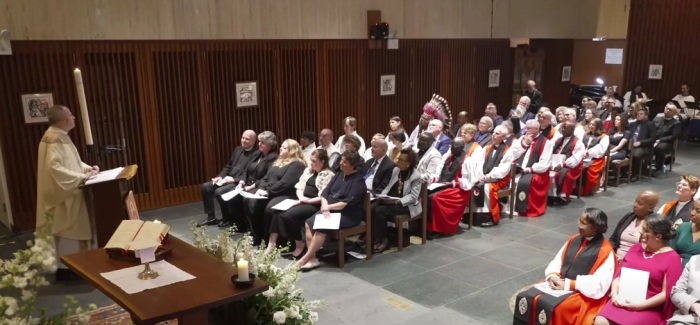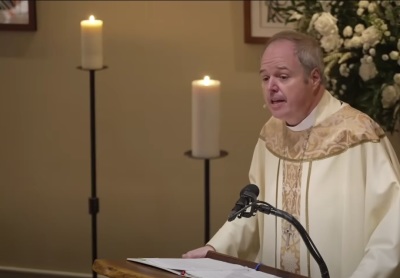Sean Rowe installed as new leader of Episcopal Church; stresses unity, need to ‘finish the job’

The Rt. Rev. Sean Rowe has taken over as the new leader of The Episcopal Church, declaring at his installation service that the denomination must unify and “finish the job” of witnessing to a “hurting world.”
Rowe was officially installed as presiding bishop of The Episcopal Church in a ceremony at the Chapel of Christ the Lord in New York, New York, on Saturday, succeeding the Rev. Michael Curry, who in 2015 had become the first African American head of the denomination.
During his sermon, Rowe preached John 11:38-44, which recounts the story of Jesus raising Lazarus up from the dead. After Lazarus was brought back to life, Jesus ordered the crowd to “take off the grave clothes and let him go.”
“We will find ourselves, I believe, reflected in the crowds standing around Lazarus’ tomb,” said Rowe. “Over and over again, we will stand together, sometimes afraid, sometimes bewildered, looking for life, hoping for wholeness in all things.”
“Over and over, God will call us to finish the job, to wipe away the tears, to bear witness, to unbind the captives and set them free, to participate in the Kingdom of God, to make it manifest in the world right here, right now,” he added.

Rowe said the “unbinding and liberating of ourselves and our structures and our hurting world” will “require us to set aside our disbelief and our divisions, our attachments to the things of this world and maybe our attachment to the way we think things ought to function.”
“This sort of unbinding, though, is nothing less than standing against the lies of the enemy,” he continued. “This is the enemy who would keep us small and lifeless and hopeless.”
“This is the enemy that would have us saying ‘We can’t do any better than we’re doing.’ The enemy who would keep us bound and will keep us bound if we prize our own preferences, traditions and comforts above the need to collaborate, to share, to work creatively to proclaim the Gospel.”
Rowe maintained that churches and dioceses within the denomination cannot “go it alone,” but rather, they “must acknowledge our mutual interdependence, our need to do ministry together, to share what we have and to sustain one another.”
“In this badly hurting world, we need to become one church,” he stated. “We’re not a collection of dioceses and institutions, a collection of the ways of doing things. We are one church, one church in Jesus Christ.”
“This work, the work of proclaiming in word and deed that Jesus’ resurrection and life, is the work to which God has called The Episcopal Church, now and always, as one church, together.”
The bishop of the Episcopal Diocese of Northwestern Pennsylvania and the Episcopal Diocese of Western New York, Rowe was elected at the 81st General Convention in Louisville, Kentucky, in June.
Rowe received 89 out of 158 votes from the Episcopal House of Bishops, passing the minimum threshold of 82 votes. His election was then confirmed in a vote by the Episcopal Church House of Deputies.
According to his official biography, Rowe was elected bishop of Northwestern Pennsylvania on the first ballot in 2007 at age 32, making him the youngest Episcopal bishop at the time.
Rowe has also served as parliamentarian for the House of Bishops, a member of the Standing Commission on Structure, Governance and Constitution and Canons, chair of the Episcopal Church Building Fund and a member of the Greater Buffalo Racial Equity Roundtable.
Soon after being elected, it was announced that Rowe was not going to hold his investiture service at the Washington National Cathedral as was traditional but instead would hold the event at the much smaller venue of the Chapel of Christ the Lord at the denomination’s headquarters in New York, New York.
“With gratitude to all involved, I have decided to begin this ministry in a new way,” Rowe said in a June statement.
“With a simple service at the Church Center that will include everyone via livestream, we can care for God’s creation by reducing our collective carbon footprint.”
The Episcopal Church traces its roots to the late 18th century and has been a prominent denomination in United States history. Over the past few decades, however, it has experienced considerable membership decline due to multiple factors.
According to a report from September of last year, the Church’s membership in 2022 was approximately 1.58 million, which is well below the nearly 2 million members reported in 2010.




























